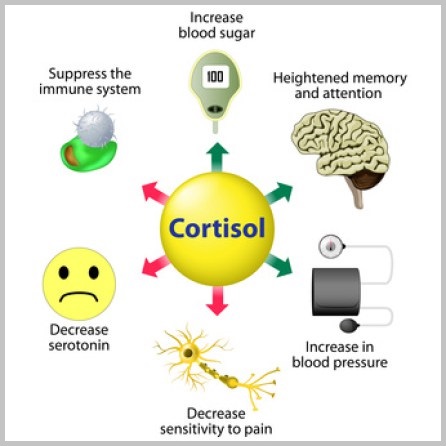Cortisol is the stress hormone – it spikes during moments of physical or mental stress. It’s secretion increases during moments of physical exertion, as during weight training or jogging, as well as in stressful situations in everyday life. There is also increased secretion of cortisol during sleep deprivation.
Cortisol is necessary for the body in normal levels. It has very important functions, for example helps regulate the water and salt balance and helps regulate blood pressure. Awakens us from sleep. But frequently high cortisol is a problem.
Elevated levels of cortisol influence muscles by breaking them down, causing catabolism (breakdown of muscle protein). Muscle breakdown occurs through extraction of amino acids. (Amino acids are the building blocks of protein, and protein is the building block of muscles.) This catabolism occurs in order to transport the amino acids to the liver where they will be converted into glucose (blood sugar). One of the reasons for this is that the body wants to create fuel and energy. This hormone prompts the body to break down muscle tissue to meet its (urgent) energy needs by converting it into sugar (glucose). Over time, this is why muscle mass gradually decreases and fat increases – not directly because of age, but because cortisol (a stress hormone) slowly “consumes” muscle tissue and promotes fat storage.
 Cortisol is useful in fight or flight situations – in such moments the body needs and gets extra energy from internal sources (no time to wait for food, digestion or rest). This is one of its functions. Excessive exercise, improper diet, inadequate sleep, all these factors lead to increased cortisol levels. Other reason it has negative influence on muscle growth and our overall health is that it is totally antagonistic to testosterone. When cortisol increases, testosterone levels automatically decrease.
Cortisol is useful in fight or flight situations – in such moments the body needs and gets extra energy from internal sources (no time to wait for food, digestion or rest). This is one of its functions. Excessive exercise, improper diet, inadequate sleep, all these factors lead to increased cortisol levels. Other reason it has negative influence on muscle growth and our overall health is that it is totally antagonistic to testosterone. When cortisol increases, testosterone levels automatically decrease.
Another negative function of cortisol is that in high levels it worsens the immune system.
Function
Cortisol is released during moments of stress in which the body needs additional energy to cope. This energy is created by converting non-carbohydrate materials into sugars. Thus cortisol raises blood sugar, but disallows its removal by insulin, i.e. getting it into cells (=deliberate insulin resistance). Why?
During moments of stress, cortisol cuts off many body functions such as reproductive hormones, digestive processes, healing and repair processes. Stress means jeopardy. The body is adapted to handle threatening situations this way. In such moments the body doesn’t need reproduction or healing, instead, it redirects the energy into essential functions to fight or flight, lowering all other functions.
For example, someone during stressful situation (which for the body means fight or flight), doesn’t have a desire for reproduction. No desire to eat, no appetite. The mechanism is cut off. (Increased appetite comes later, but for this we’ll devote a special article.) Instead fighting off infections, the energy that would be assigned to the immune system, will be assigned to other parts. Cortisol puts the body fight or flight condition, by strengthening the appropriate functions for this, and cuts off or lowers all other functions. In a moment of sudden high stress (such as the danger of being bitten by an animal), there is usually an increase in instant energy, hearing, and sensitivity. If you’ve ever been chased by a dog, recall how effortlessly your legs propelled you as you ran.
All this is normal if these are rare situations. The body comes back to normal. But if a person is frequently under stress, they will have chronically elevated cortisol.
Chronically high cortisol
Chronically spiked cortisol will cause chronically elevated insulin and chronically lowered testosterone and growth hormone!
 Cortisol doesn’t allow the other parts of the body to get the needed energy, only the necessary parts. Thus chronically elevated cortisol can cause chronically lowered immunity and inclination to various ailments. If you’ve switched the body into fat-burning regime, increased cortisol will reduce the rate of fat burning or will switch it back to sugar-burning regime.
Cortisol doesn’t allow the other parts of the body to get the needed energy, only the necessary parts. Thus chronically elevated cortisol can cause chronically lowered immunity and inclination to various ailments. If you’ve switched the body into fat-burning regime, increased cortisol will reduce the rate of fat burning or will switch it back to sugar-burning regime.
Sugar gives quick energy, exactly what cortisol needs because what happens is a stressful circumstance, an emergency, a threat.
Thus cortisol prevents the use of body fat.
Chronically high cortisol leads to chronically high level of blood sugar. This leads to increased insulin due to the blood sugar elevations. Unused sugar gets converted and stored as fat, first in the area of the waist and inside the abdominal cavity, around the organs. Later on, insulin starts having less and less effect and elevates more and more. The cells that secrete it get overloaded and then their function worsens. If this continues, the body can come into a condition whereby it can’t produce enough insulin.
Cortisol is one of the main reasons for fat gain and accumulation of body fat around the waist and inside the abdominal cavity, around the organs. Even a thin person, with chronically elevated cortisol will accumulate fat around the waist, firstly in the abdominal cavity.
Recommendations:
- Have a meal within 60 minutes after your workout.
- Don’t exercise after 10 P.M. The body starts shutting down its function after 10 P.M. and automatically becomes more vulnerable because the immune system is less active as well. A workout after 10 is an excessive stress to it. The immune system recognizes the workout as an attack and starts defending itself by increasing inflammation.
- Don’t exercise every day, don’t exercise over 60 mins. A workout duration should be no more than 60 minutes, ideally 45, with a day rest after. (With the right lifestyle adaptations, as achieved through our programs, you can safely perform longer and more frequent workouts without the excess cortisol and achieve better results from your training sessions).
- Sleep at least 8 hours a night. Insufficient sleep will greatly elevate cortisol.
- Lower your coffee intake. Drink no more than 2 coffees a day. Much coffee = much cortisol.
- Avoid alcohol. Regular drinking, even in “moderate” amounts, consistently raises cortisol. In other words, it leads to chronically elevated cortisol levels.
- If you are often stressful, nervous, upset, your cortisol will increase. It is time for change. Do something about it, without antidepressants.






